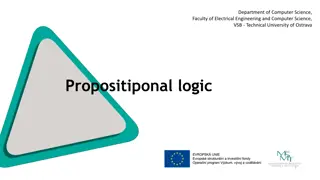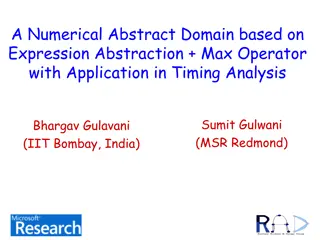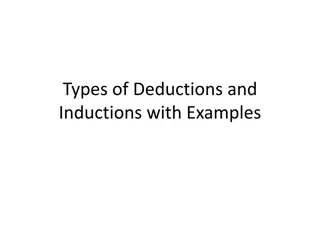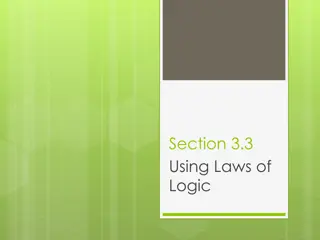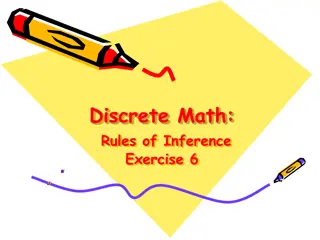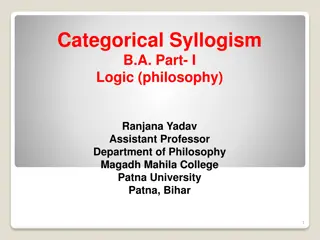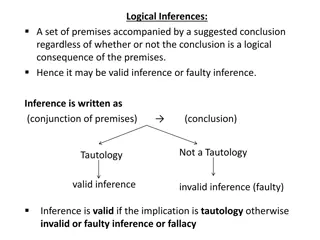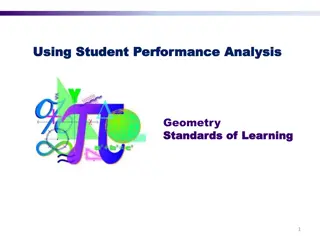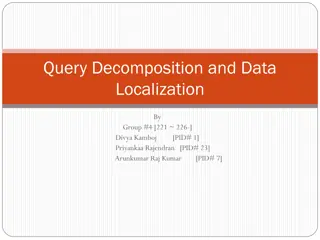Normal Forms in Propositional Logic
Explore the concept of normal forms in propositional logic, where each formula has a unique truth-value function. Learn about equivalence of formulas, determining normal forms, and canonic forms like Disjunctive Normal Form (DNF) and Conjunctive Normal Form (CNF). Discover how to find canonic forms
2 views • 22 slides
Numerical Abstract Domain with Max Operator in Timing Analysis
Explore a numerical abstract domain based on expression abstraction and the Max operator with applications in timing analysis. The challenges in timing analysis, such as disjunctive and non-linear bounds, are discussed along with simple examples illustrating these concepts. The difficulty of proving
1 views • 21 slides
Deductive and Inductive Reasoning
Explore the world of deductive and inductive arguments through examples of deductive reasoning based on definitions and math, including categorical syllogisms, hypothetical syllogisms, and disjunctive syllogisms. Delve into inductive reasoning and the key distinctions between deductive and inductive
1 views • 26 slides
Laws of Logic and Logical Reasoning
Laws of logic play a crucial role in reasoning and making deductions. This comprehensive guide explains the use of contrapositives, examples of conditional statements, and the significance of laws like the Law of Syllogism. Understanding these principles helps in effectively analyzing statements and
0 views • 8 slides
Rules of Inference Exercises and Solutions in Discrete Mathematics
Explore exercises and solutions in discrete mathematics focusing on rules of inference. Analyze logical premises and draw relevant conclusions using rules such as modus tollens, modus ponens, and disjunctive syllogism. Understand the application of these rules in different scenarios to reach valid d
0 views • 4 slides
Categorical Syllogism in Logic: A Comprehensive Overview
Categorical syllogism, a form of inference with two premises and a conclusion, is a fundamental concept in logic. This type of deductive argument consists of three categorical propositions - universal affirmative, universal negative, particular affirmative, and particular negative. Terms such as maj
0 views • 16 slides
Logical Inferences and Rules of Inference
Logical inferences involve drawing conclusions from premises, which can either be valid or invalid based on the rules of inference. This includes Modus Ponens, Hypothetical Syllogism, DeMorgan's Law, and Law of Contrapositive. Invalid inferences result in fallacies like denying the antecedent. Exerc
0 views • 18 slides
Geometry Standards of Learning Practice Problems
Explore practice problems related to Geometry Standards of Learning (SOL), covering topics such as symbolic representation of arguments, laws of detachment, contrapositive, syllogism, counterexamples, and geometric proofs. Test your understanding of angles, lines, transversals, and congruence to str
0 views • 50 slides
2-4 Deductive Reasoning
Deductive reasoning entails drawing logical conclusions from given statements or facts. This involves applying the Law of Detachment and Law of Syllogism to deduce new information based on established truths. Through examples and visuals, explore how these principles guide reasoning processes and le
0 views • 10 slides
Categorical Syllogisms: Types and Examples
A categorical syllogism is a deductive argument based on the relations of classes (categories) where a conclusion is drawn from two premises involving three terms. In standard form, the premises and conclusion are in categorical form (A, E, I, O), each term occurs twice, and the middle term does not
0 views • 27 slides
Satisfiability Modulo
In this lecture by Sriram Rajamani, key topics covered include the integration of theory solvers, Nelson-Oppen method for combining theories in conjunctive formulas, and deciding satisfiability of disjunctive theory formulas using SAT solvers. The discussion delves into stably infinite theories, con
1 views • 28 slides
Deductive Reasoning: Logical Conclusions & Syllogisms
Explore deductive reasoning with examples of logical conclusions using the Law of Detachment and Law of Syllogism. Learn to draw conclusions based on given information about angles, figures, and relationships. Enhance your problem-solving skills in geometry and logic.
0 views • 10 slides
Criminal Immigration Law Topics: Almanza-Arenas, Dimaya, and Void for Vagueness
Explore key legal decisions such as Almanza-Arenas and Descamps that impact criminal immigration law, including divisible statutes, jury requirements, and court interpretations. Understand the nuances of disjunctive terms and elements in statutes for effective legal analysis.
0 views • 20 slides
Understanding Query Decomposition and Data Localization
Explore the process of query decomposition and data localization in databases, covering normalization, analysis, and the importance of transforming queries for efficient processing. Learn about disjunctive and conjunctive normal forms and how query analysis helps ensure query correctness.
0 views • 16 slides
